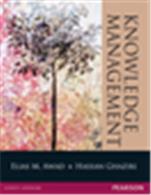Knowledge Management

|
Author(s):
Author:
Elias M. Awad
- ISBN:9788131714034
- 10 Digit ISBN:8131714039
-
Price:Rs. 880.00
- Pages:480
- Imprint:Pearson Education
- Binding:Paperback
- Status:Available
-
|
The KM subject matter is a subset of content taught in the Decision Support Systems course. This text is about knowledge—how to capture it, how to transfer it, how to share it, and how to manage it. Awad takes students through a process-oriented examination of the topic, striking a balance between the behavioral and technical aspects of knowledge management and use it.
Table of Content
- THE BASICS.
- Working Smarter, Not Harder.
- Understanding Knowledge.
- KM System Life Cycle.
- KNOWLEDGE CREATION AND CAPTURE.
- Knowledge Creation and Architecture.
- Capturing Tacit Knowledge.
- Other Knowledge Capturing Techniques.
- KNOWLEDGE CODIFICATION AND SYSTEM IMPLEMENTATION.
- Knowledge Codification.
- System Testing and Deployment.
- Knowledge Transfer and Knowledge Sharing.
- Knowledge Transfer in the E-World.
- KM SYSTEM TOOLS AND PORTALS.
- Learning From Data.
- Data Mining—Knowing the Unknown.
- KM Tools and Knowledge Portals.
- ETHICAL, LEGAL, AND MANAGERIAL ISSUES.
- Who Owns Knowledge?
- Managing Knowledge Workers.
- Where Do We Go from Here?
|
Salient Features
- Learning by example is evident throughout the text. Concepts, principles, or procedures that are either technical or new are followed by examples or illustrations for easy learning.
- Boxed vignettes throughout each chapter are brought in from the field through journals or Web sites.
- Illustrations are incorporated where necessary for clearer understanding of the material.
- Implications for knowledge management relates chapter material to knowledge management or management decision making.
- Knowledge exercises available at the end of each chapter offer a variety of both straightforward and more thought-provoking applications.
- A summary at the end of each chapter brings into focus the essence of the chapter.
- Terms to Know are selected key terms from each chapter.
|
|
|
|
|